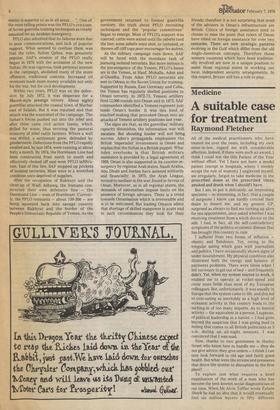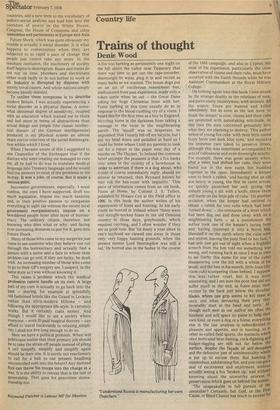Medicine
A suitable case for treatment
Raymond Fletcher
All of the medical practitioners who have treated me over the years, including my own sister-in-law, regard me with considerable affection. Indeed, if there were such ari award, I think I could win the title Patient of the Year without effort. Yet I have not been a model patient (except in hospitals, where I meekly accept the rule of women). I neglected myself, ate irregularly, forgot to take medicine in the prescribed doses at the prescribed times, smoked and drank when I should't have.
But I am, to put it delicately, an interesting specimen — so interesting, in fact, that a couple of surgeons I know can hardly conceal their desire to dissect me; and my present GP, surprised as always to find me turning up alive for one appointment, once asked whether I was receiving treatment from a witch-doctor on the side. I had, in fact, all the self-contradictory symptoms of the politico-economic disease that has brought this country to ruin I suffered from two forms of inflation — obesity and flatulence. Yet, owing to the irregular eating which goes with journalism and politics, I have occasionally shown signs of under-nourishment. My physical condition also illustrated both the energy and balance of payments problems. There were times when I felt too weary to get out of bed — and frequently didn't. Yet, when my system started to work, it enabled me to operate at rocket-speed and cover more fields than most of my European colleagues. But, unfortunately, it was usually in Europe that the system came to life, and this led to over-eating as inevitably as a high level of economic activity in this country leads to the sucking-in of too many imports. As to mental activity — the equivalent in a person, I suppose, of political leadership in a nation — I had gone beyond the suspicion that I was going mad (a feeling that comes to all British politicians at 3 a.m. during an all-night session). I was convinced that I was mad.
Now, thanks to two gentlemen in Harley Street who know how to handle me — they do not give advice they give orders — I think I can now look forward to old age and fairly good health. But what were the strains and pressures that drove the system to disruption in the first place?
To explain just what requires a brief examination of the work of a man who has become the best-known social diagnostician of our time. When Mr Alvin Toffler wrote Future Shock he had no idea that it would eventually find six million buyers in fifty different countries, add a new term to the vocabulary of politico-social analysis and lead him into the corridors of power in the White House, Congress, the House of Commons and other assemblies and parliaments in Europe and Asia.
Future Shock, which was quite obviously my trouble is actually a social disorder. It is what happens to communities when they are subjected to so rapid a pace of change that people just cannot take any more. In the resultant confusion, the machinery of society itself begins to disintegrate. Buses and trains do not run on time, plumbers and electricians either work badly or do not bother to work at all. Industry is disrupted by disputes with utterly trival causes. And whole nations simply become bloody-minded.
To outline these symptoms is to describe Modern Britain. I was actually experiencing a social disorder as a physical illness. A somewhat abnormal degree of .sensitivity, coupled With an education which trained me to think and feel more in terms of abstractions than actual things and people (the classic intellectual disease of the German intelligentsia) produced in my physical system an almost exact mirror-relection of the social distintegration within which I lived.
When I became aware of this I suggested to one Chancellor of the Exchequer that if the doctors who were treating me managed to cure me, all he had to do was to translate medical language into Treasury language and he would find the answers to most of the problems in his in-tray. It was a joke, of course. But it made a serious point.
Successive governments, especially, I must confess, the ones I have supported, draft too much legislation, impose too much taxation and, in their positive passion to reorganise everything in sight (as witness the recent local government reorganisation), impose on a bewildered people layer after layer of bureaucracy. The ordinary citizen, therefore, not knowing who does what or why, and facing ever-increasing demands to pay for it, goes into Future Shock.
Many of those who come to my surgeries just come to see someone who they believe can cut through the bureaucracy and actually find a person with a name and a face to whom their Problem can go and, if they are lucky, be dealt with. An increasing number of those who come to go to their GP's surgery are, I suspect, in the same state as I was without knowing it.
This raises a problem which the medical profession cannot handle on its own. A large Part of my cure is actually to go back into the past — staying, for example at splendidly Old-fashioned hotels like the Grand in Locarno rather than ultra-modern Hiltons — and following the appropriate life-style. It certainly works. But it certainly costs money. And though I would like to see a society where everyone — even ill-paid hospital doctors — can afford to travel backwards to relaxing .simplicity I shall not live long enough to do so.
Here we have a political problem. When will Politicians realise that their primary job should be to take the strain off people instead of piling it on? Simplify, simplify and simplify again Should be their aim. It is surely not reactionary to call for a halt to our present headlong uncontrolled rush into the future? Any damned fool can throw his troops into the charge in a war. It is the ability to retreat that is the test of generalship. That goes for peacetime statesmanship too.



























 Previous page
Previous page